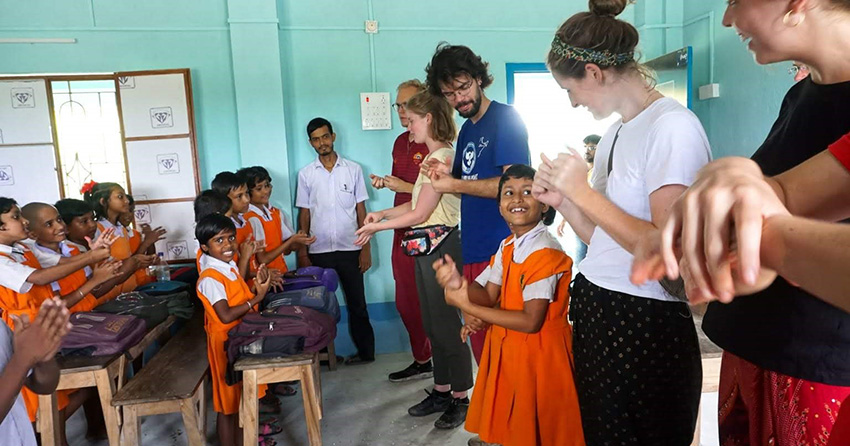Report from Kolkata: Caitlin Rigler on her medical elective improving hygiene awareness in West Bengal

Caitlin (second from right) and other volunteers teach hygiene principles to children in Kolkata
This summer, thanks to the generosity of the Ashok Ranganathan bursary, I visited Kolkata for my medical elective.
I arrived in Kolkata on the last day in July, ready to work for a month in the Institute for Indian Mother and Child (IIMC), a developmental organisation set up nearly three decades ago by a Paediatrician named Dr Sujit Bramochary. The organisation’s primary aim is to improve the standard of living and prospects for poorer people living in rural West Bengal, predominantly south of Kolkata. In this region, up to 60% people are classified as “Below Poverty Line” – currently classified as an income less than 37 Rupees per person, per day. When it was first founded, the Institute’s focus was to provide medical care for rural people, in the form of distributing medication; treatment for wound and skin infections; and regular health check-ups. Over the last couple of decades, however, the project has evolved to encompass other aspects of developmental work including microcredit programmes, women’s empowerment groups, sanitation projects and now primarily education.
Arriving as a fourth year medical student, I was keen to work in the outdoor medical clinics. I learnt a great deal about certain health problems specific to the area; for example, severe dermatitis and dermal fungal infections were prolific amongst women visiting the clinics due to a combination of factors including unclean bathing water, humid conditions and the specific way in which saris are tied in West Bengal. Although women could have these infections treated on a weekly basis for only 10 Rupees per visit, this was not sufficient to eradicate completely the infection and was also extremely inconvenient for the large proportion of women who made round trips of more than five hours.
I quickly realised, therefore, that developmental projects require more than just medical input. In order to break the cycle, it is important to educate those with little health knowledge about the importance of things like using clean water and soap. The IIMC achieved this through its primary/secondary education programme (over 30 schools have been built) and by training selected women from remote villages to become health workers, who have monthly teaching sessions to enable them to provide a basic community medical service. Financial empowerment through the microcredit programmes also enabled women to save as little as 10 Rupees a week as protection against future medical problems; they could then take out loans from the IIMC against their savings to set up small businesses to increase their earning power. I appreciate that these are very core principles of developmental work I am describing, however I felt like my trip to Kolkata enabled me to really appreciate first-hand how medicine, education, economics, social empowerment and other factors interact when trying to implement development strategies. There is so much more to healthcare than just treating the presenting physical symptoms – a principle I will take forward into my practice in the UK!
For every one thing I learned during my direct volunteering sessions, I learned five more by living and experiencing Indian culture for a month! I left Kolkata with a much greater understanding of the challenges facing medical care in other countries, and a newfound perspective on global medicine which I will take into my clinical studies. Importantly also, without wishing to sound cliché, I really did learn a lot about myself and my abilities – it turns out I am better at dealing with new and challenging situations than I had thought!
I am so grateful for the bursary that gave me the opportunity to make this trip. I hope to set up a more permanent connection between the IIMC and Exeter College, whether it be through future volunteering or JCR fundraising, there are lots of possibilities. However this relationship may develop, I am delighted to report that the bursary has already established a positive connection between Exeter College and Kolkata.
